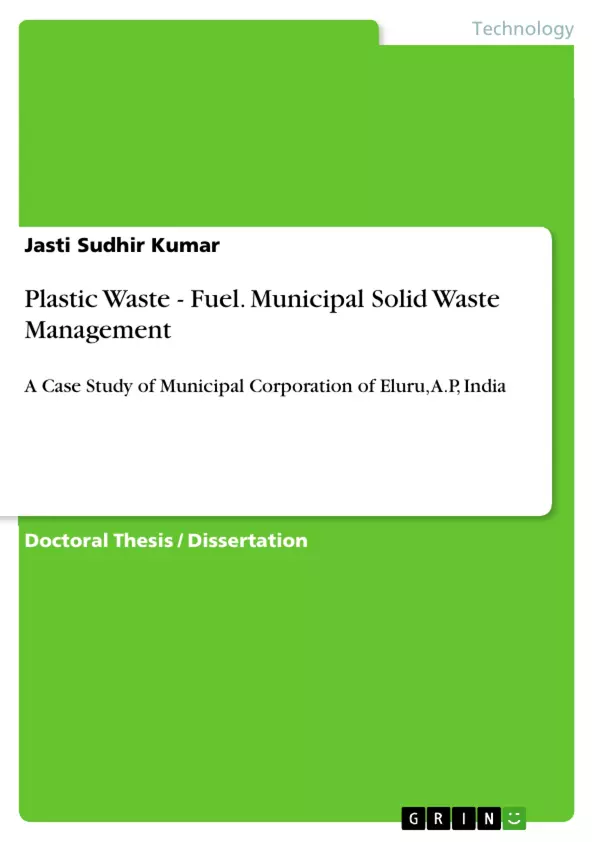India, the second most populous and one of the fast developing economies in the world is poised to increase its general prosperity and standard of living and in the process is increasing its consumption levels of energy and consumer goods.In general, the quantity and the diversity of MSW are increasing year after year throughout the world, presenting a growing problem for local authorities necessitating new legislation as well as better management practices. Earlier solid waste was considered as an unwanted byproduct of the society but now it is considered as a resource out of place. Though landfills are the most common means of solid waste disposal, the increasing quantities of solid waste is rapidly filling the existing landfills, and new sites are difficult to establish especially in a country like India. Hence efforts are on to find alternatives to landfills and in this direction approaches like source reduction; recycling, composting and incineration are considered.
In this context the present study entitled “Some Experimental Studies on Management of Municipal Solid Waste” (A Case Study of MCE) was undertaken to study the present scenario of MSW management in Andhra Pradesh considering the Municipal Corporation of Eluru (MCE) on the East coast of India as the study area.
Under the present scenario of MSW management in Andhra Pradesh, the status of present MSW management in Municipal Corporation of Eluru is studied in this work and some experimental studies were conducted in the following areas with an objective of better utilization of waste into a useful resource so as to set up model facilities on demonstration basis for implementation and to share the information for dissemination to other local bodies in the state and at national level.
1.To find out the quantification and composition of MSW
2.To estimate the power generation potentiality from MSW
3.To estimate the possible revenue from vermin compost if prepared from the bio- degradable fraction of MSW
4. To study the combustion, performance and emission analysis of plastic diesel derived from plastic waste as an alternate fuel at different fuel injection pressures in comparison with neat diesel.
The implementation of plastic diesel derived from plastic waste on the diesel engine with blends of neat diesel and with cetane number improver at different fuel injection pressures is done and the performance, combustion and emission results are discussed.
Inhaltsverzeichnis (Table of Contents)
- ABSTRACT
- ACKNOWLEDGEMENTS
Zielsetzung und Themenschwerpunkte (Objectives and Key Themes)
This thesis investigates the management of municipal solid waste (MSW) in the Municipal Corporation of Eluru (MCE), Andhra Pradesh, India. The primary objective is to explore ways to improve MSW management by transforming waste into a valuable resource.
- Quantify and analyze the composition of MSW generated in Eluru.
- Estimate the potential for power generation from MSW.
- Assess the feasibility of producing vermin compost from biodegradable waste.
- Examine the combustion, performance, and emissions of plastic diesel derived from waste plastic as an alternative fuel.
Zusammenfassung der Kapitel (Chapter Summaries)
This thesis focuses on the analysis and management of municipal solid waste (MSW) in the city of Eluru, India. The research explores various aspects of MSW management, including waste characterization, energy recovery potential, and the production of compost. It also delves into the potential use of plastic diesel, derived from plastic waste, as an alternative fuel in diesel engines.
Schlüsselwörter (Keywords)
The primary keywords and focus areas of this thesis include: municipal solid waste (MSW), waste management, energy recovery, power generation, vermin composting, plastic diesel, alternative fuel, combustion, performance, emissions analysis, and environmental impact.
Frequently Asked Questions
Can plastic waste be converted into fuel?
Yes, the study examines the production of "plastic diesel" from waste plastic as a sustainable alternative to traditional fossil fuels.
What is the focus of the MSW study in Eluru?
The research analyzes the composition of municipal solid waste and explores resource recovery through power generation and composting.
How efficient is plastic diesel in engines?
The work analyzes combustion, performance, and emission levels of plastic diesel blends compared to neat diesel at various injection pressures.
What is vermin composting in waste management?
It is a method of using earthworms to transform biodegradable organic waste into high-quality nutrient-rich fertilizer.
Why are alternatives to landfills necessary in India?
Landfills are rapidly filling up and new sites are difficult to establish, making recycling and waste-to-energy technologies essential.
- Citar trabajo
- Dr. Jasti Sudhir Kumar (Autor), 2011, Plastic Waste - Fuel. Municipal Solid Waste Management, Múnich, GRIN Verlag, https://www.grin.com/document/283340



